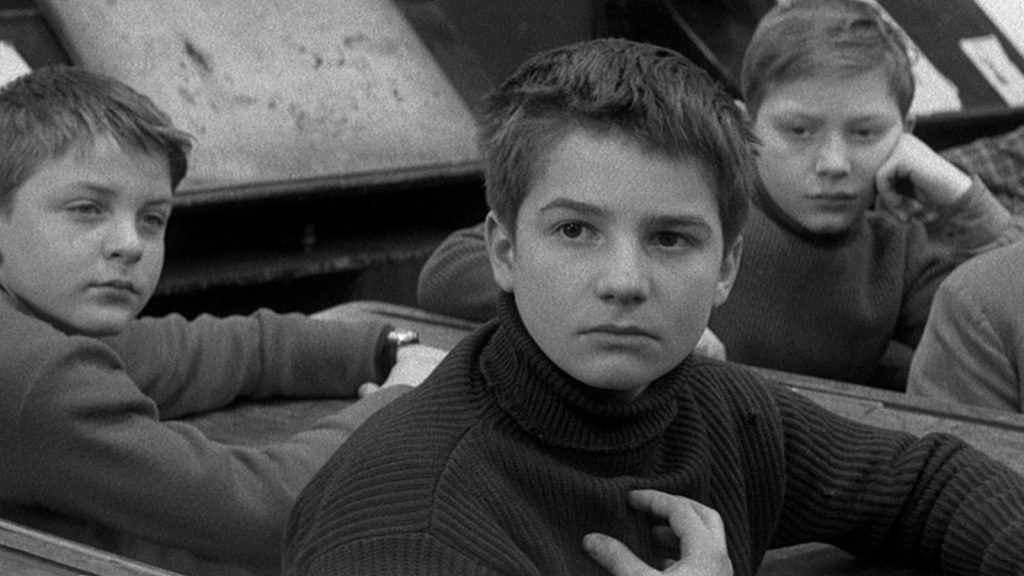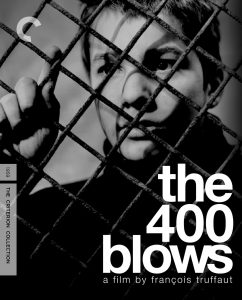
Growing up sucks and François Truffaut’s 1959 debut feature captures every gritty second of it. Much like the tumultuous transition that it solemnly transcribes onto celluloid, this coming of age film is timeless and is sure to keep you thinking well into adulthood.
Truffaut came out swinging with his defining New Wave film that blew away audiences at the Cannes Film Festival. It is also worth mentioning that Truffaut was nominated for the coveted Palme d’Or that year while also winning Best Director. What is particularly interesting is the fact that Truffaut was kicked out of Cannes the year prior due to concerns that the then critic had been overly harsh with some of the films and their respective directors. Now, The 400 Blows is considered a highly influential film as well as one of the greatest French films ever produced.

The film follows a young French boy by the name of Antoine Doinel (Jean-Pierre Léaud) as he “raises hell” through the belly of Paris. We see as Antoine’s life spins further and further out of control due to a string of terrible adolescent decisions. The film is not structured as one grand narrative like most people might be accustomed to but rather like short episodes encompassing different days during a particularly rowdy winter. These episodes are further structured as a series of causes and effects. Antoine is forced to steal a typewriter from his step-father Julien’s (Albert Rémy) office half way through the film because he was caught with a pinup calendar at his desk at the beginning of the film. Things start off relatively innocent but quickly escalate as Antoine’s inner turmoil becomes harder and harder to contain.
The film is a loose organization of events that often times don’t seem to be going anywhere nor serve a point, but that is precisely the point. The film follows Antoine as he himself feels directionless about his future and the film properly conveys that feeling to the viewer. It isn’t shy about presenting how bleak his situation actually is. The camera works double duty not only as a window into his life but as a witness of a similar age. The camera follows Antoine around as if it were merely another kid in the school yard keeping their distance from “that one kid”. Yet, it can also be endearing as it pulls in close to keep Antoine company much like a close friend as his parents fight in the next room. Rarely does the film shift away from focusing solely on Antoine’s internal and external ordeals. The writing is also remarkably gritty and realistic. Characters in this film speak as the real people they represent, and not in flowery poetics that are often common with art house films. The real poetry comes from the acting.
The actors are at their best when they are just being, especially Léaud. His numb yet desperate expressions say more than sonnets could. At the beginning the character of Antoine gives off the impression that he is just a no-good rascal, but as he tries and tries you can’t help but feel for him. Léaud is perfect as a juvenile whose reserved demeanor seems to scream for a hug and an “everything is going to be OK, champ” that never comes. The rest of the actors play exceptional roles as teachers and parents, especially the mother played by Claire Maurier, who much like Léaud, expresses more through body language than through words. You can palpably feel, even through the screen, how burdened she feels caring for such a rambunctious young boy.
Truffaut creates a harrowing yet accurate depiction of how confusing, frustrating, scary, and intimidating growing up can be. It may not be a classic to some, but The 400 Blows provides a cathartic experience for those of us still haunted by puberty.
 Francisco Ramos has been described as a “film bro” on more than one occasion. Don’t get him started on how much he hates popcorn.
Francisco Ramos has been described as a “film bro” on more than one occasion. Don’t get him started on how much he hates popcorn.
